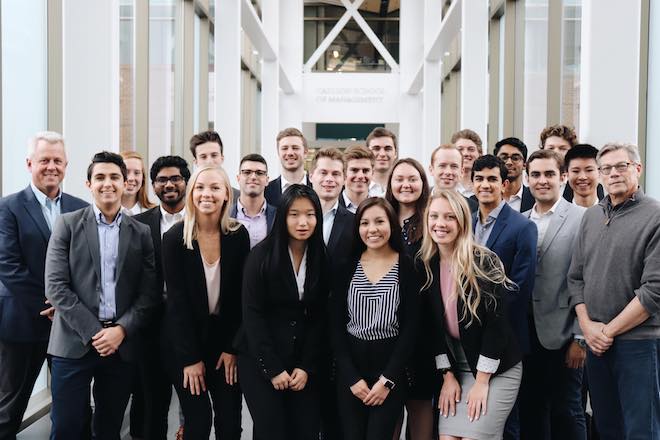
The Atland Ventures team. Courtesy photo
Atland Ventures: Minnesota Carlson’s Student-Run VC Fund
Speaking of innovative, student-run clubs, another one popped up recently at the University of Minnesota’s Carlson School of Management. Launched in 2016, first as an independent study course within Carlson’s undergraduate program, that has morphed into the first for-profit fund where students get a return on successful investments. It functions just as any other VC firm does, charging a management fee, making money out of its investments, and repaying investors the same way.
“What we want to achieve as a fund is to allow students to understand the process of raising money for a startup or new venture idea and to understand the key factors driving startup success and how investors evaluate them,” Matt Jessen-Howard, director at Atland Ventures, said.
While Atland is a student-run fund, it’s backed by real-world VCs and advisors from prestigious firms as McKinsey, Boston Consulting Group, and Goldman Sachs. Atland receives funding support from its alumni network and referrals by its advisors.
Lucas Vaz, a Carlson student and managing partner at Atland, says the interaction with real-world VC’s is critical to the learning experience.
“We will know how to think like angel investors and VCs because we’re talking to those people,” Vaz says. “So, we are having this interaction with them and we’re learning how to think like investors that invest in startups.”

The Bee Corp co-founders pictured from left to right are Wells, Symes, and Kuntz. Courtesy photo
Indiana Kelley’s Bee Corp Team
Big data and beekeeping aren’t exactly a combination many people think about that. But a trio of graduates from Indiana University are set on changing that.
“We wanted to spend our careers solving problems that matter to us,” Ellie Symes, one of the co-founders told us earlier this year. “Food issues were a major focus of my undergraduate studies. The beekeeping industry is a great fit for our interests because it directly impacts production of many staple foods in our diet.”
Symes and her teammates noticed that there was little to no objective data collected on the health and activity of beehives, even though the beekeeping industry directly impacts the production of many staple foods. So they are setting out to fix the issue.
“Though there are a number of companies that offer sensors designed for beehives, no company had made much progress towards interpreting the data being collected,” says Wyatt Wells, another co-founder. “We saw an opportunity to specialize in analyzing data collected from beehive sensors.”











Questions about this article? Email us or leave a comment below.